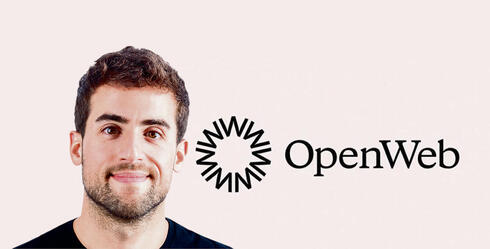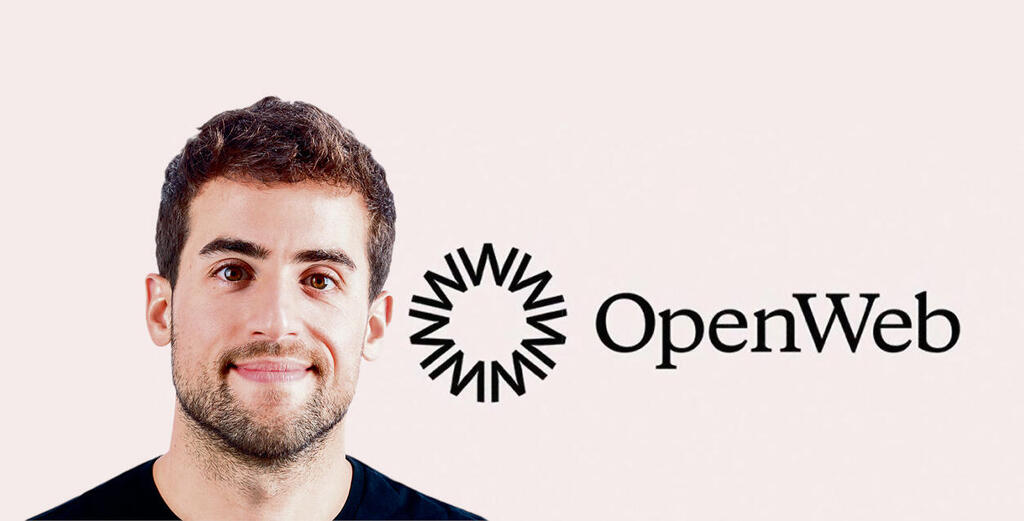
Ousted OpenWeb founder launches legal fight, says board illegally removed him
Nadav Shoval’s lawsuit accuses Insight Partners and other shareholders of orchestrating his ouster, claiming secret meetings and unlawful decisions led to his dismissal as CEO.
A month after his surprising removal as CEO of the unicorn OpenWeb, Nadav Shoval has filed a lawsuit and a request for an injunction against some of the company’s shareholders and members of its board of directors. Shoval claims that the board meeting in which it was decided to remove him was held illegally, and he now seeks to prevent any actions based on the decisions made at that meeting. Specifically, he aims to block the appointment of Tim Harvey as interim CEO in his place. Shoval founded OpenWeb in 2012 with Roee Goldberg and Ishay Green, and has been leading the company ever since.
"On a clear day, without any warning, a number of directors met in secret and decided that my rights in the company I founded no longer existed," Shoval claims in the lawsuit, which was filed on Monday through the Agmon and Tulchinsky law firm in the Tel Aviv District Court. "These directors convened a meeting in secret, without informing me or the directors I appointed, in violation of the Companies Act and the company’s articles of association," the lawsuit continues. Shoval alleges that these directors acted hastily and without justification, making illegal 'board decisions.'
The lawsuit is primarily directed against Jeff Horing, founder of the American venture capital fund Insight Partners, which is one of the most active investors in Israel. Shoval sees Horing as the main initiator of his removal, alongside Margaret Wu and Sean Ellis. Insight is the largest shareholder in OpenWeb, with other shareholders including Georgian (represented by Wu), which led the company’s latest fundraising round that made it a unicorn in 2021. Additional shareholders include Omer Ziegler, Harel Insurance Company, Entrée Capital, the New York Times, Dentsu, and Samsung Next. Shoval, as stated in the lawsuit, owns 7% of the company’s shares. Another director of the company is Scott Galloway, a professor at New York University’s School of Business, who previously invested in OpenWeb. Shoval’s lawsuit also targets Galloway, despite their past alliance.
Shoval alleges that the directors hoped to create a situation where, by the time legal action could be taken, the situation at the company would settle, leaving him outside the company. Shoval is now seeking to appoint two directors of his own, but according to the Herzog law firm representing OpenWeb (in a response attached to the lawsuit), these directors were not invited to the next board meeting scheduled for October 9th. Shoval himself was only invited after his inquiry on September 30th. According to Shoval, the company’s board currently has nine members, while he claims he is entitled to four directors, Insight to only one, and the Georgian fund to two. Another director could represent the shares held by the Russian investment fund Centillion, which also turns out to be a shareholder in OpenWeb.
Shoval claims that in the summer of 2024, he was surprised to learn about changes to his role as CEO, including a shift where he would report to the chairman of the board instead of the board itself, as had been the case since the company’s founding. His involvement in appointing the chairman of the board was also revoked. From email correspondence included in the lawsuit, it appears that Noam Bardin, former CEO of Waze and a former Google executive, was considered for the chairman role. Shoval objected, writing to Scott Galloway that Bardin lacked sufficient experience with public companies to serve as chairman of OpenWeb (which is still a private company). Shoval viewed this change as a violation of his contract and sent a protest letter to the board. In response, the board accepted his letter as a resignation, despite Shoval explicitly stating that he was not resigning. "At that time, I was unaware that this was part of a multi-stage plan to sever my control over the company," Shoval wrote in his request for an injunction.
Shoval’s injunction request also includes letters from senior officials at companies that are clients of OpenWeb, expressing support for Shoval and hinting that they might reconsider their contracts with the company if he is removed as CEO.
A particularly notable affidavit attached to the request comes from Avishai Abrahami, CEO of the public company Wix, who also serves as a director at OpenWeb. Abrahami, chosen as an expert and neutral director from a list provided by Shoval, revealed that he received an invitation to participate in a phone call with some board members on September 6th, but since the invitation was sent that morning he was unable to take part. He was told Shoval was not informed of the meeting due to a supposed "conflict of interest." During that call, it was decided to accept Shoval’s resignation based on the letter he had sent regarding the changes to his powers.
However, in a later board meeting that Abrahami attended, it was decided that Shoval would be fired even if he had not resigned. "I asked the lawyer if the decision was legally sound, and the lawyer said yes, that there was a quorum for the meeting," Abrahami said. After the meeting, Abrahami was asked to urgently sign off on Shoval’s dismissal on September 11th. "Although I signed the decision, I didn’t pay close attention to the details due to the urgency, and in hindsight, I realized I signed off on his dismissal 'with cause.' If I had noticed this detail, I would have objected, as this goes against my position," Abrahami added.
The drama at OpenWeb escalated in early September when the company held a meeting with all employees, announcing that Tim Harvey would replace Shoval as CEO. However, soon after, Shoval sent an email to employees stating that he had no intention of stepping down. “The board has falsely stated that I am stepping out of my role as CEO. Let me be clear: that is not true and not my intent,” Shoval wrote in a LinkedIn post and an email to employees.
OpenWeb employs 370 people, following a significant round of layoffs last year. Among its clients are major media outlets such as CNN, FOX News, Yahoo, and the Wall Street Journal. To date, the company has raised approximately $400 million. A few days after the board's decision to replace Shoval, his name was removed from the company’s website.















